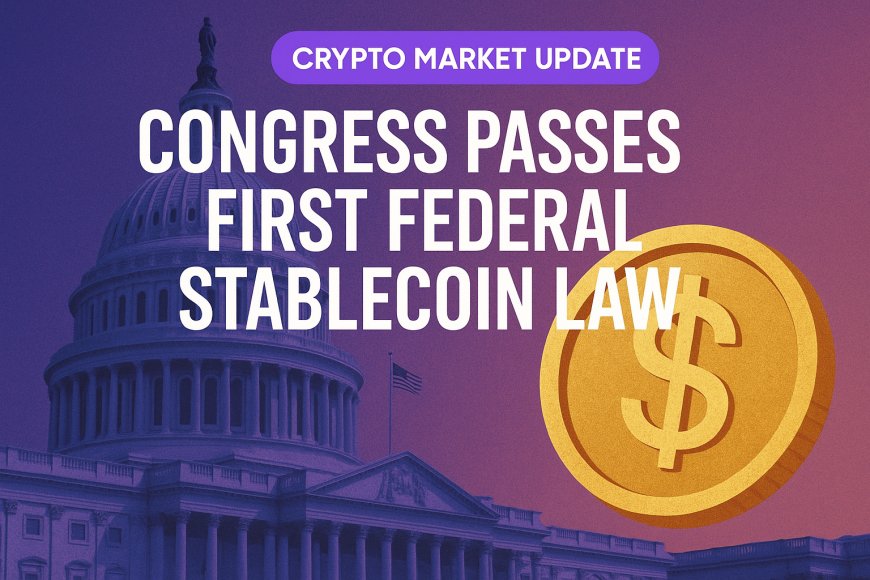Historic Crypto Milestone: Congress Approves First-Ever Federal Stablecoin Regulation

In a landmark move for the crypto industry, the U.S. Congress has passed its first-ever federal law regulating stablecoins, marking a pivotal step toward greater legal clarity for digital assets.
Bitcoin gained momentum from renewed optimism surrounding U.S. crypto regulations and sustained institutional investments. The House of Representatives greenlit three major legislative efforts, including the CLARITY Act, boosting investor sentiment. Meanwhile, short-lived speculation about Federal Reserve Chair Jerome Powell’s removal briefly disrupted markets, though the White House quickly denied the rumor.
Analysts at Deutsche Bank highlighted consistent inflows into crypto ETFs, with BlackRock’s IBIT surpassing $80 billion in assets under management, signaling Bitcoin's emergence as a mainstream financial instrument.
Ethereum (ETH) showed strength as well, priced at $3,604.95, reflecting a 7.2% gain in the last 24 hours, with a daily low of $3,382.09 and a high of $3,669.85.
Altcoin Price Snapshot
-
Solana (SOL) traded at $180.04, up 4.1%, with a low of $172.08 and a peak at $184.13.
-
XRP stood at $3.45, up 7.8%, with values ranging between $3.21 and $3.65.
-
Sui (SUI) dropped 2.7%, priced at $4.03, with fluctuations from $3.91 to $4.23.
-
Cardano (ADA) gained 4.3%, trading at $0.8524, swinging between $0.7885 and $0.8865.
Legislation Ushers In New Era for Stablecoins
Congress has officially passed the Genius Act, the first U.S. law aimed at regulating stablecoins. The bill, which previously secured bipartisan support in the Senate, now heads to President Trump’s desk for final approval.
This legislation introduces comprehensive rules for stablecoin issuers, requiring full reserve backing, mandatory audits, and adherence to anti-money laundering standards. Lawmakers stress that these measures are essential to secure a fast-expanding industry pegged to the U.S. dollar but previously lacking regulatory oversight.
Stablecoins play a critical role in digital finance by enabling smooth transactions and transfers without the wild price swings seen in other cryptocurrencies. Treasury Secretary Scott Bessent believes this framework could help push the stablecoin market to $3.7 trillion by 2030.
In addition to the Genius Act, Congress also passed two other bills: one clarifying the classification of digital assets as either securities or commodities, and another preventing the Federal Reserve from introducing a central bank digital currency (CBDC) without congressional authorization.
Crypto Market Cap Breaks $4 Trillion
Following the legislative success, global crypto market capitalization exceeded $4 trillion for the first time ever. Investor enthusiasm surged, particularly during what traders are calling “Crypto Week” in Washington.
Ethereum led the charge with a 22% rally over five days, while Bitcoin hit a record-breaking $123,205, continuing to dominate over 50% of the total market.
The rally reflects renewed confidence that a regulatory foundation is forming in the U.S., paving the way for safer and broader crypto adoption.
In July alone, U.S.-based Bitcoin and Ethereum ETFs saw $8.4 billion in total inflows, as more institutional players entered the space.
House Blocks Digital Dollar Rollout
Another major development came as the House passed the CBDC Anti-Surveillance State Act, halting any Federal Reserve efforts to launch or pilot a digital dollar without express congressional approval.
This legislation comes amid intensifying opposition, particularly from Republican lawmakers, who worry that centralized digital currencies could enable mass surveillance of personal financial data.
The bill passed by a narrow margin of 219–217, marking the third key piece of crypto-related legislation to clear the chamber this week.
Unlike decentralized cryptocurrencies, CBDCs are fully controlled by the government, raising concerns over their potential programmability and monitoring capabilities.
With these votes, the U.S. House has advanced major crypto policies on stablecoins, digital asset classification, and CBDCs — a comprehensive policy package now awaiting consideration by the Senate.




















![[LIVE] Crypto News Today, Sept 1, 2025: Bitcoin Dips Below $108K as GameFi Leads Sector Losses](https://www.thecryptohome.com/uploads/images/202509/image_430x256_68b53b4737757.jpg)








